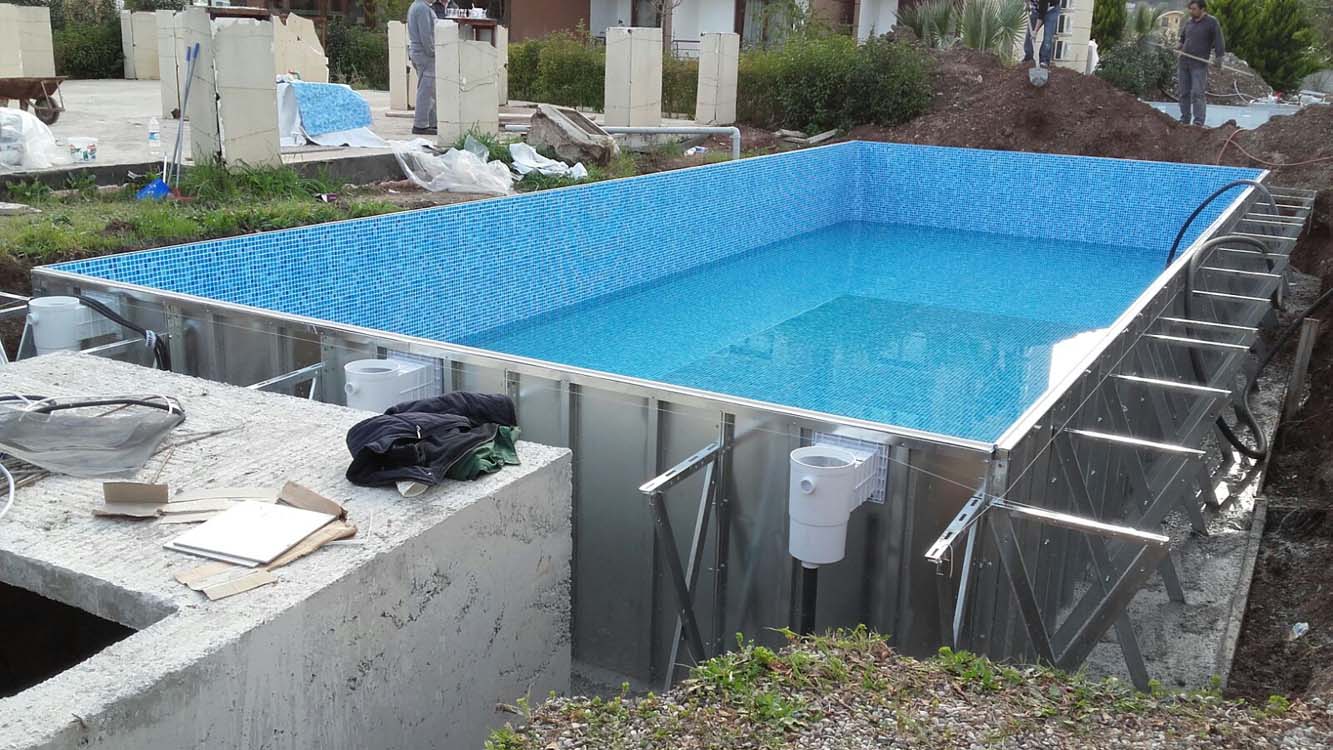Prefabrikated Pool Systems

Prefabricated Pool Systems
Prefabricated Pool Systems, often referred to as ready-made pool systems, are pre-designed and manufactured pool solutions intended for quick and easy installation. Compared to traditional concrete pools, these systems require less time and labor. There are two main types:
1. Panel Pools
- Material Options: Made from metal, plastic, or sometimes wooden panels.
- Installation: Panels are assembled to form the structure of the pool.
- Flexibility: Panel pools are customizable in various shapes and sizes to suit user needs.
2. Fiberglass Pools
- Pre-Made Design: These pools are manufactured in fiberglass material and pre-shaped at the factory.
- Quick Installation: Delivered as a single unit, fiberglass pools can be installed rapidly.
- Advantages: They feature a smooth surface, making them easy to maintain and long-lasting.
Installation Process for Prefabricated Pool Systems
Prefabricated pools are known for their simplified and quick installation process. The steps differ based on the type of pool:
Panel Pool Installation
-
Site Selection and Preparation:
Choose and level the area for installation. Excavation may be needed to create a flat surface. -
Foundation Preparation:
Lay a concrete foundation to provide a stable base for the pool. -
Panel Assembly:
Panels are connected according to the desired shape and size and secured with screws or special connectors. -
Interior Lining and Insulation:
The interior surface is lined with a waterproof material, such as PVC membrane. -
Plumbing and Electrical Connections:
Install water circulation, filtration, and lighting systems. -
Final Checks and Filling:
Test all connections and equipment, then fill the pool with water.
Fiberglass Pool Installation
-
Site Selection and Excavation:
Dig a hole shaped to fit the fiberglass pool. -
Base Preparation:
Level the base of the hole and apply a concrete layer if necessary. -
Pool Placement:
Use a crane or similar equipment to position the fiberglass pool into the excavated area. -
Backfilling and Drainage:
Fill the surrounding area with materials to provide support and ensure proper drainage. Additional concrete may be poured for reinforcement. -
Plumbing and Electrical Connections:
Install the water circulation, filtration, and lighting systems. -
Final Checks and Filling:
Conduct a thorough test of all systems before filling the pool with water.
Factors Affecting Pool Longevity
The lifespan of a pool depends on several factors, including the materials used, maintenance practices, and environmental conditions. Key factors include:
-
Maintenance and Cleaning:
Regular maintenance prevents wear and tear on surfaces and equipment. -
Chemical Balance Management:
Proper pH, chlorine, and chemical levels protect the pool's surface and equipment. -
Material Quality:
High-quality materials reduce the risk of cracks, leaks, and wear. -
Environmental Conditions:
Sun exposure, temperature changes, and precipitation can impact the pool's durability. -
Usage Frequency:
Intense or frequent use can accelerate wear and tear. -
Water Quality:
Hard or dirty water can damage pool surfaces and equipment over time.
Lifespan by Pool Type
-
Vinyl-Lined Pools:
Typically last 7 to 15 years. However, the vinyl liner may need replacement more frequently. -
Fiberglass Pools:
Can last 20 to 30 years. Fiberglass materials are durable and require minimal maintenance. -
Concrete/Gunite Pools:
With proper maintenance, these pools can last 50 years or more. Periodic resurfacing may be required.
Conclusion
Prefabricated pool systems offer significant advantages in terms of fast installation and cost efficiency. Panel and fiberglass pools cater to different user preferences and needs. With proper installation, high-quality materials, and regular maintenance, these pools provide a long-lasting, safe, and enjoyable swimming experience.
